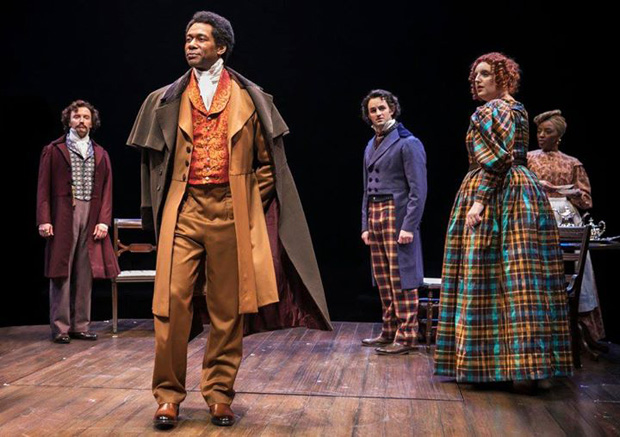Red Velvet

(© Liz Lauren)
In the 1820s, an aspiring African-American actor named Ira Aldridge (Dion Johnstone) set sail for England from New York. His turns in smaller theaters and smaller towns earned him accolades and excellent returns, but he was barred from the most acclaimed theaters because of his skin color. As the English Parliament fiercely debated the passage of the Slavery Abolition Act, Aldridge was given a chance to play Covent Garden’s esteemed Theatre Royal. When the legendary Edmund Kean collapsed onstage while playing the title role in Othello, company manager Pierre LaPorte (Greg Matthew Anderson) called on his longtime friend Aldridge to take Kean’s place — making him the first black man to play the Moor in a major theater.
Audiences were spellbound by Aldridge’s performance. Critics, however, were dismissive at best and often fiercely cruel, likening the actor to a trained animal or sideshow freak. After just two performances, the theater went dark. Though Aldridge went on to have a lauded career as a tragedian elsewhere in Europe, he never returned to the London stage.
Lolita Chakrabarti's play Red Velvet, now running at the Chicago Shakespeare Theater, focuses on the single rehearsal leading up to Aldridge’s debut and the two nights following his performances as Othello. It dramatizes how the Kean company, led by Edmund Kean’s son Charles (Michael Hayden, in a scathingly pompous performance), is torn asunder by the addition of the iconoclastic actor. Horrified by what he sees as a "fashionable" perversion of traditional casting, Charles quits on the spot. He is nearly followed by stalwart actor Bernard Ward (Roderick Peeples) — until Bernard realizes that he will replace Charles as Iago.
Leading lady Ellen Tree (the poised Chaon Cross), however, is willing and eager to play Desdemona opposite Aldridge, who is a more thoughtful and naturalistic performer than the elder Kean. Junior actors Henry Forester and Betty Lovell (Jürgen Hooper and Bri Sudia, respectively, who wring every drop of humor out of their small roles) relish the controversy — and resulting notoriety — that the casting brings to their production.
To modern audiences, these petty behind-the-scenes squabbles cut deeper even than the London critics' brazenly prejudiced reviews. Aldridge’s ferocious talent is overlooked, even by self-styled progressives who see his casting only as an extension of his race. Despite the political weight of the play, Red Velvet is quite funny, poking fun at the "teapot style" of classical acting — one hand always resting at an actor's hip, the other gesticulating grandly to the side. Framing scenes in which the irascible, aging Aldridge grudgingly reveals his life story to a plucky Polish journalist (Annie Purcell, who also plays Aldridge’s wife Margaret) feel predictable and familiar, but they showcase a great comic rapport between Purcell and Johnstone, who excels in the role of the temperamental genius, packing a powerful voice and matching it with brooding introspection.
Gary Griffin’s arena staging is smooth and precise, making the most of Scott M. Davis's gorgeously constructed set, complete with the titular red velvet curtains. The period detailing on Mara Blumenfeld’s costumes is equally rich. Some of the scene transitions are overly long, but lively original music by Jenny Giering fills the time pleasantly. Though it feels a tad long, Red Velvet offers an insightful perspective on conversations about inclusion and authenticity that are taking place in contemporary theaters throughout America and the world at large











